Europe day: Celebrating 60 years of unity
Special focus on the youth
The EU is a miracle and a true friend of Uganda, says Schmidt
As the European Union (EU) celebrates 60 years of existence, Ambassador Kristian Schmidt, the EU head of delegation to Uganda in an exclusive interview told Umaru Kashaka and Sidney Miria about the bloc's long-term relations with Uganda, the East African region and how they will carry on even after Brexit\
You have been in Uganda since November 2013 as the EU ambassador. What are some of your enduring impressions of the country?
I would say there are maybe three things that after almost four years that stand out. First of all, of course the people. The combination of the kindness of Ugandans that I have met here, I think that is something that l will remember forever.
This is combined with the resilience in the daily struggle because life is not easy for many Ugandans. That I think is impressive.
Many Europeans if they have never been in Africa and they think of Africa they might think of a continent that is torn by war, bad governance, etcetera, but what they discover when they come here is that they see people and we are all the same human beings trying and struggling.
And I think that is one of my first observations. The second, I would say is the beauty and potential of Uganda as a country. When you travel around Uganda and you see the climate, you see the natural resources it shows potential.
Yeah, you really think there is no reason why this country should be lagging behind neighbours, like Rwanda or Kenya. Thirdly, the strengths of the dialogue that we have with the government and political actors in this country.
We don't always agree, I mean Uganda's government is responsible for Uganda and I represent Europe. We stand on two different sides but the quality of dialogue, even when we don't agree is something that I have really appreciated during my time here.
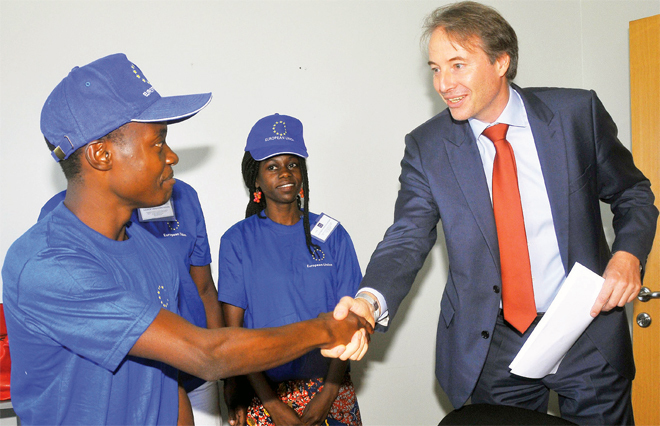 The head of the European Union delegation, Kristian Schmidt right welcoming Najidu Sonko and Salminah Najjuma during an EU meeting with young Ugandans to discuss issues affecting them. This was at the Eu headquarters in Kampala. Photo by W. Sanya
The head of the European Union delegation, Kristian Schmidt right welcoming Najidu Sonko and Salminah Najjuma during an EU meeting with young Ugandans to discuss issues affecting them. This was at the Eu headquarters in Kampala. Photo by W. Sanya
What have the past 60 years of the EU meant for Uganda as a country and the East African region?
I think we have come a long way. If you look back 60 years in our history, Europe was created when there were still colonial ties between Europe and Africa.
That is now a thing of the past. We no longer look at the relationship of supremacy or colonial links. European Union was always founded on the principle of equal partnerships with former colonies, so as an institution we never had any colonial hangover.
For us, it was always about an equal partnership and that I think is what we now see.
Also, as we move from development cooperation towards trade relations and global partnerships some of the issues we now work on with Uganda are global problems that we face together like climate change, security and immigration.
It is not about Europeans coming to help Africans in Uganda, it is about us discussing how we manage together global problems. CLICK HERE FOR MORE ON THIS INTERVIEW
Joining hands to ensure a conflict-free Rwenzori
On a Saturday afternoon on November 26, 2016 tensions that had been building over weeks erupted into violence in Kasese town, which is home to the Rwenzururu Kingdom.
Police raided offices of the kingdom in response to attacks on police posts in the region allegedly conducted by the royal guards. Eight royal guards were killed in this raid and two others were arrested.
The following day, the police supported by the army (UPDF) raided the Rwenzururu palace after an ultimatum given to the royal guards to surrender expired.
The palace was attacked and police sources indicated that 87 royal guards had been killed during the raid on the palace and the number of police men killed during the period was put at 16. Ugandans and the world were left stunned by the turn of events in Kasese.
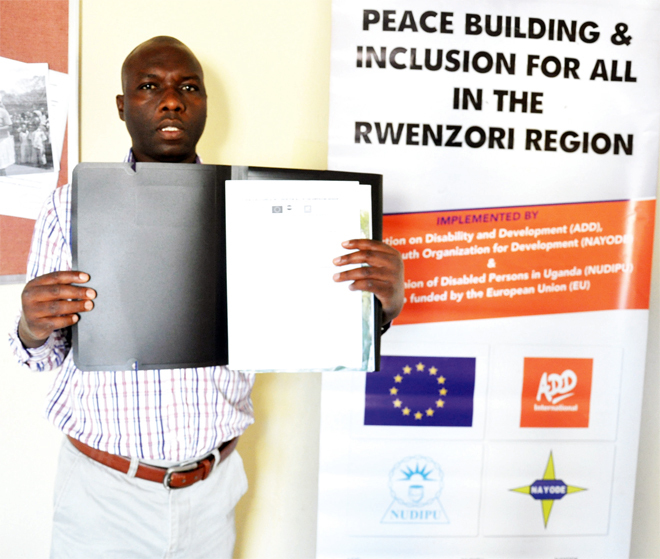 Tumwine says the Rwenzururu kingdom has a long history of conflict
Tumwine says the Rwenzururu kingdom has a long history of conflict
Peace interventions
The National Youth Organisation for Development is currently leading a 36-month Peacebuilding and Inclusion project in the Rwenzori region.
They are working together with the Kasese District Union of Persons with Disabilities (KADUPEDE) and Kabarole District Union of Persons with disabilities (KADIPU) to instil peace in the region, And the peace project is CLICK HERE FOR MORE ON THIS STORY
ADVERTISER
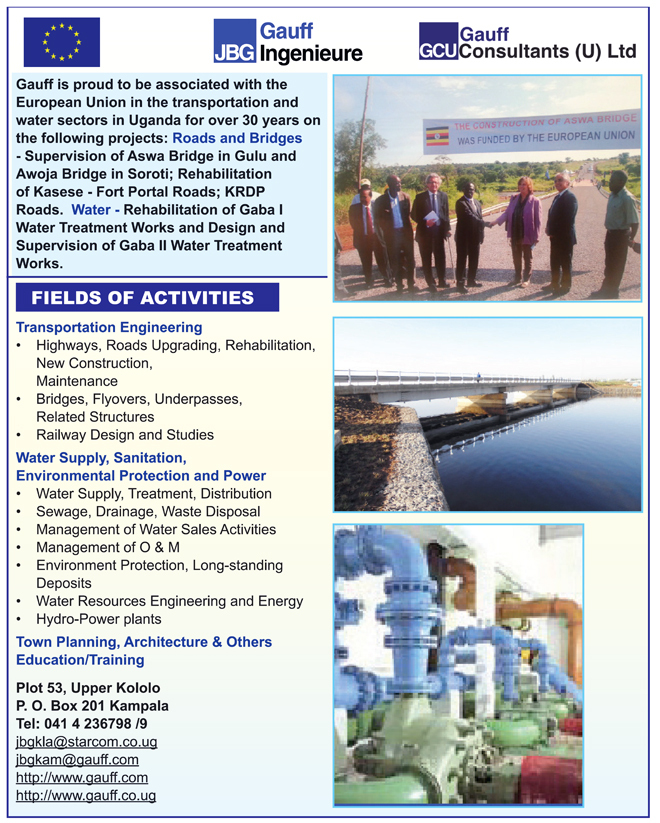
Refugees benefit from emergency fund
By Prossy Nandudu
The prolonged drought that hit the country last year did not only affect Ugandans, but it also affected the refugees.
They faced a severe water shortage for both domestic use and their animals. The most affected were those in the refugee settlement areas in the district of Adjumani at Mungula I refugee camp.
This influx of refugees from South Sudan shot up in July last year with the renewal of hostilities between forces loyal to President Salva Kiir and former vice-president Riek Machar.
To support these refugees, a humanitarian agency used to ferry water from River Nile and supply it to the camps.
"Because we are many, sometimes we miss out or get little, according to the 21-yearold Garang who stays with his family in the camp. He helps his mother to collect water from the truck that takes water to the camp.
Their plight captured the First Deputy Prime Minister, Moses Ali's eye, who called on humanitarian agencies to consider water and sanitation as a priority for refuges and host communities.
"We are surrounded by river Nile from Pakwach through Paraa. It turns out ,we have water in the Nile and the only remedy is to carry water to the camp because every camp is about 12 miles from the river," said Ali.
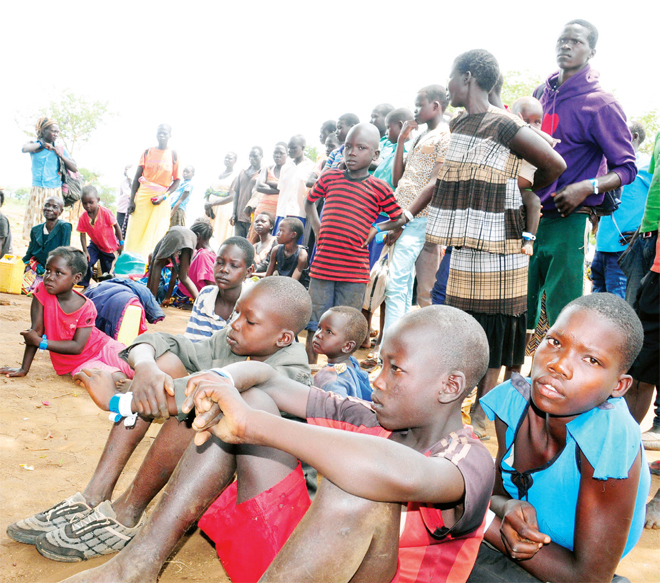 Women and child refugees from South Sudan find it hard to get clean safe water. The EU has set up a €10m fund to cater for water problems among other challenges
Women and child refugees from South Sudan find it hard to get clean safe water. The EU has set up a €10m fund to cater for water problems among other challenges
Relief through EU?
His call was answered by the European Union recently who launched the EU Emergency Trust Fund (EUTF), under the Support Programme for Refugee Settlements and Host Communities in Northern Uganda (SPRS-NU), in Adjumani district.
The €10m fund also seeks to address the root causes of destabilisation, forced displacement and irregular migration in the Horn of Africa.
The programme is designed to promote equal economic opportunities, security and development.
While launching the fund at Mungule I refugee settlement in Adjumani in February, the head of co-operation at the EU delegation to Uganda, Michelle Labeeu, said the fund will support all aspects of stability, contribute to better migration management as well as addressing all root causes of destabilisation, forced displacement and irregular immigration in the Horn of Africa. CLICK HERE FOR MORE ON THIS STORY
ADVERTISER
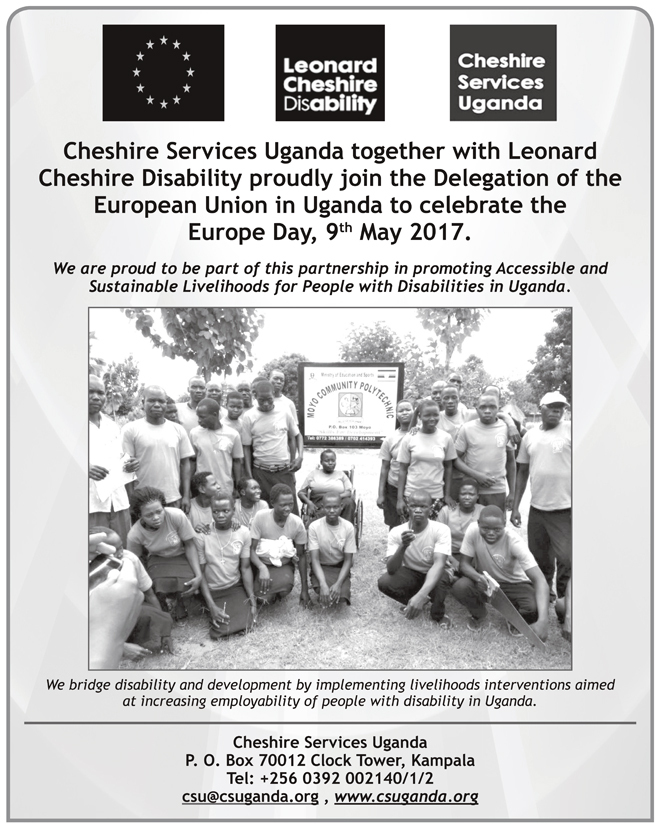
Celebrating 60 years of peace in Europe
By Umaru Kashaka and Agencies
On March 25, the European Union (EU) celebrated its 60th anniversary since the Treaty of Rome was signed, which laid the foundations for what the EU is today.
Since then, the citizens of Europe have enjoyed six decades of peace, prosperity and security, unprecedented in modern history. The contrast to the first half of the 20th century could not be greater.
Two catastrophic world wars in Europe between 1914 and 1945 left millions dead, and a continent devastated, divided and prostrate. For countries that had long been at war, European integration has been the most successful peace project in our history.
The Treaty of Rome cemented an economic agreement between six European countries that ultimately paved the way to today's EU. On that spring day, France, Belgium, Italy, Luxembourg, the Netherlands and what was then West Germany agreed to a customs union, aiming to create a single market for goods, labour, services and capital across all member states.
They formed the European Economic Community (EEC), rooted in the idea that open, tariff-free trade would make every member better off. Sixty years on from Rome, the EEC is the EU, a bloc of 28 member states who cooperate on everything, from trade to counter-terrorism to tourism.
While there is no way of knowing how Europe would have fared without the EU in place, the last six decades have been a time of unprecedented peace and prosperity for a continent with a long history of bloodshed.
At a time when Brexit and a wave of Euroscepticism pose serious challenges to the EU, here is a look back at some of the major achievements of the past 60 years.
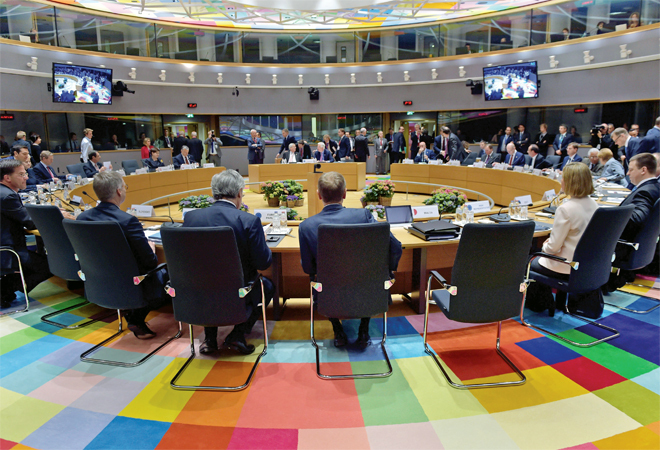 European Heads of State meet during a EU summit in Brussels, Belgium on April 29, 2017. To join the EU, a country first joins the broader Council of Europe, a human rights organisation. No country can join the Council of Europe, unless it ends the death penalty first
European Heads of State meet during a EU summit in Brussels, Belgium on April 29, 2017. To join the EU, a country first joins the broader Council of Europe, a human rights organisation. No country can join the Council of Europe, unless it ends the death penalty first
Freedom to live, work anywhere
Freedom of movement is one of the major principles of the EU's common market — and one of the more contentious, with fears over immigration feeding into a populist backlash.
However, it is worth remembering that in the EU today, over 500 million people enjoy the right to live, study or work in any of the EU's 28 member states.
Around 14 million EU citizens live in a different country, according to statistics from 2014. The EU also created the Schengen Area, a zone of passport-free, border-less travel that covers over 400 million people.
Most EU members are part of Schengen, along with some non-EU countries — namely, Iceland, Norway, Switzerland and Liechtenstein. Schengen means you can theoretically get on a train in Vilnius and get off in Valencia without having to show your passport.
Although some border controls have been reinstated in the wake of the refugee crisis and terrorist attacks, the agreement is still in place. CLICK HERE FOR MORE ON THIS STORY
ADVERTISER
ACTION ON DISABILITY AND DEVELOPMENT
AUSTRIAN DEVELOPMENT COOPERATION (WSDF-SW)
AUSTRIAN DEVELOPMENT COOPERATION (WSDF-E)
By Taddeo Bwambale
By the time the Second World War ended in the mid-1940s, Europe was plagued by poverty, unemployment and economic instability.
European countries came to realize that the effects of the internecine war transcended the battlefield to the economic realm across much of the continent.
Broken by the ravages of war, the major economies in Europe agreed to foster economic cooperation, culminating into the Treaty of Rome that established the European Economic Community (EEC).
The treaty was signed in 1957 to increase economic cooperation, create a single market of countries that trade with one another so that they are more likely to avoid conflict.
After years of successful cooperation, the name changed from (EEC to the European Union (EU) in 1993 to reflect the wider principles that had united Europeans.
The EU countries are: Austria, Belgium, Bulgaria, Croatia, Republic of Cyprus, Czech Republic, Denmark, Estonia, Finland, France, Germany, Greece, Hungary, Ireland, Italy, Latvia, Lithuania, Luxembourg, Malta, Netherlands, Poland, Portugal, Romania, Slovakia, Slovenia, Spain, Sweden and the UK. CLICK HERE FOR MORE ON THIS STORY
ADVERTISER
REGIONAL INTEGRATION IMPLEMENTATION PROGRAMME (RIIP)
FINANCIAL MANAGEMENT AND ACCOUNTABILITY PROGRAMME (FINMAP III)
Britain to miss full access to European market, following Brexit
By John Masaba
Following months of bickering with pro-EU advocates, UK's Prime Minister Theresa May in March, finally, signed the letter, which triggered Article 50 and set in motion Britain's process of leaving the EU.
The move removed any lingering doubts of UK's exit from EU, dealing a blow to some of its citizens that were hanging on to a thin hope that their country might reverse last year's referendum vote to leave European membership.
Under the arrangement, UK will formally leave EU membership in 2019, which will bring to an end more than 60 years of its association with the 27-member bloc that includes Germany, France, and Italy among others countries.
Twenty four hours before signing the document, Theresa said despite UK's divorce with Europe, Brexit would bring a ‘new, deep and special partnership' with the European Union and would benefit UK immensely, despite disapproval from EU member countries.
According to Bloomberg, due to Brexit — a term for the departure of the United Kingdom from the European Union (EU) is losing its second-largest economy.
Online sources show that in 2016, about 44% of UK exports in goods and services went to EU countries.
That was £240b out of £550b total UK exports, underpinning the country's importance to the 27-member bloc. In return, 53% of imports into the UK came from EU.
Research also shows that UK is a huge source of employment for other European citizens, thanks to a provision in the EU that allows free labour movement. CLICK HERE FOR MORE ON THIS STORY
ADVERTISER
FOOD AND AGRICULTURE ORGANIZATION OF THE UNITED NATIONS
UGANDA INDUSTRIAL RESEARCH INSTITUTE (UIRI)
SNV NETHERLANDS DEVELOPMENT ORGANISATION
Meet the 11 EU heads of mission in Uganda
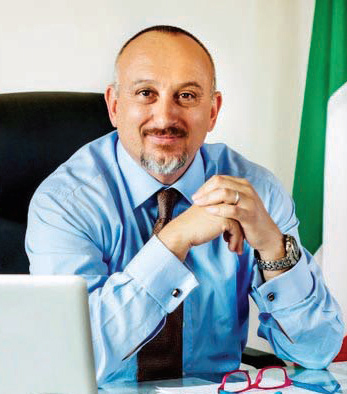
H.E Domenico FORNARA: Ambassador of the Republic of Italy Quote: "The road to pursue is neither easy nor certain, but it must be followed and it will be done!" (Cit. Altiero Spinelli, Il Manifesto di Ventotene)
Facts: Italy, an EU founding member, is at the core of the European Union integration since its beginning. The 1957 Treaties of Rome were inspired by the "Manifesto of Ventotene", written by Italian political and pan-Europeanist thinkers in their years of detention as opponents to the fascist regime. EU set itself high standards, and has proven to be thoroughly successful: totalitarianism was defeated and let space to democracy; never had long time war-torn Europe experienced over 70 years of uninterrupted peace and prosperity; human rights became the bottom line of our legislative systems. Italy provided crucial contributions to all steps of EU integration, and is looking forward to an even greater engagement in the years to come.
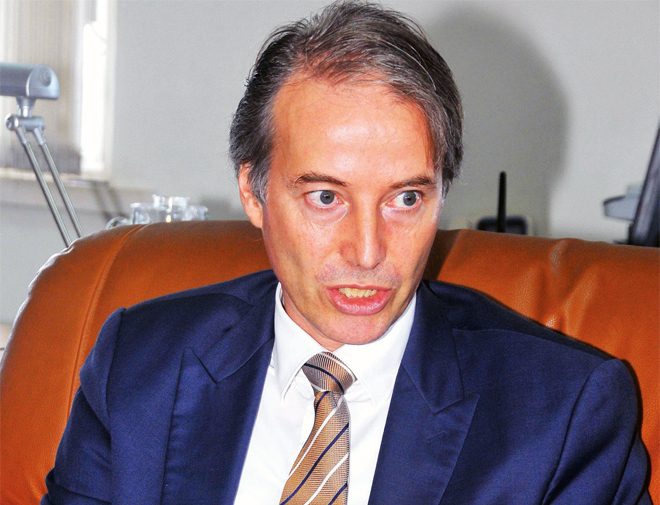
H.E. Kristian SCHMIDT: Ambassador/Head of Delegation of the European Union
Quote: "United, bold and confident, we can shape the future".
Facts: The European Union is 60 years old, 28 member states, more than 500 million citizens, 70 years of peace, 22% global GDP, 6% of world's population, the world's biggest development and humanitarian donor, a global leader on climate change governance, the second largest economy, the largest destination/greatest source of FDI flows, and home to the most equal and fair societies in the world. CLICK HERE FOR MORE ON THIS STORY
Projects implemented by EU
EU IS COMMITTED TO SUPPORTING PARTNER COUNTRIES THROUGH SUSTAINABLE DEVELOPMENT
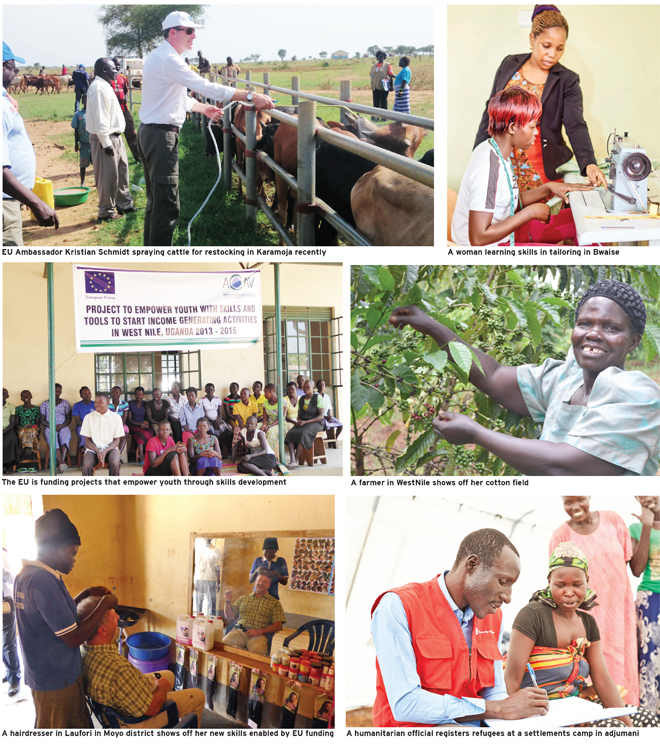
EU shares skills, improves professional capacity
As Uganda increasingly pushes for skills-based human resource capacity that will transform the country to middle income status, the role of the European Union (EU) through the different projects running across the country cannot be underestimated.
The EU as the world's largest donor is supporting education in 40 partner countries and funding to the sector in developing countries is expected to hit 4.5 billion Euros by 2020.
Erasmus mundus Erasmus Mundus is a cooperation and mobility programme in the field of higher education that aims at enhancing the quality of European higher education and to promote dialogue and understanding between people and cultures through cooperation with other countries.
The programme contributes to the development of human resources and the international co-operation capacity of higher education institutions in Third Countries by increasing mobility between the European Union and these countries.
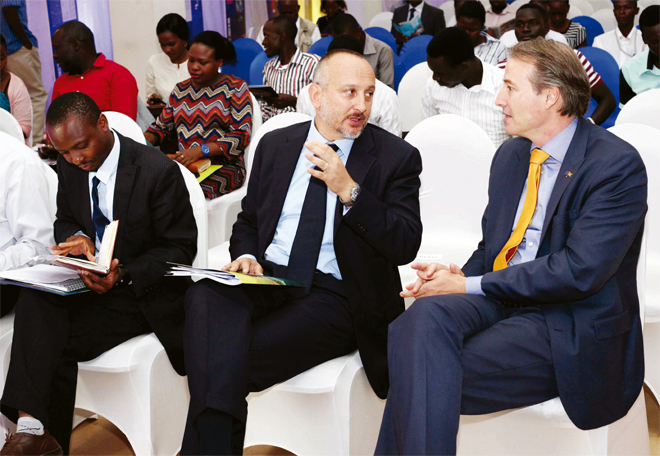 The Italian Ambassador to Uganda, Domenico Fornara (centre) talking to European Union Ambassador (right) Kristian Schmidt during the Erasmus+ Conference at UMA Conference Hall on Friday, May 5
The Italian Ambassador to Uganda, Domenico Fornara (centre) talking to European Union Ambassador (right) Kristian Schmidt during the Erasmus+ Conference at UMA Conference Hall on Friday, May 5
The programme has such opportunities as scholarships for undergraduate and master's studies, fellowships for doctoral and postdoctoral students and fellowships for teachers and researchers.
A total of 89 Ugandans have so far benefitted from the prestigious Erasmus Mundus programme.
The programme gives one an opportunity to explore postgraduate learning at different universities in two or more EU countries. In its 30th year, the Erasmus programme supports projects, partnerships, events and mobility in the areas of education, training youth and sport.
Uganda was ranked the ninth most successful African country in the 7th EU Research Framework programme and in Erasmus Mundus. According to Ambassador Kristian Schmidt, the EU head of delegation to Uganda the Erasmus Mundus is a very competitive programme. CLICK HERE FOR MORE ON THIS STORY
EU builds capacity for communities to tackle climate changes
As we moved closer to Rose Arot, a resident of Omasiaa village, Magoro sub-County in Katakwi district, the rhythmic sound and movement of her fingers as she plucked leaves from the branches of a wild vegetable was not lost on us.
The shadows were becoming longer as the sun set, and Arot, like other women in her village, was working fast to harvest enough wild vegetable to prepare a meal for her family.
A prolonged dry spell is the most difficult time for most food providers. Arot blames the food scarcity to the extremes in weather patterns.
For the last three years, Katakwi and the neighbouring districts have been experiencing food shortage as a result of a severe dry spell and floods.
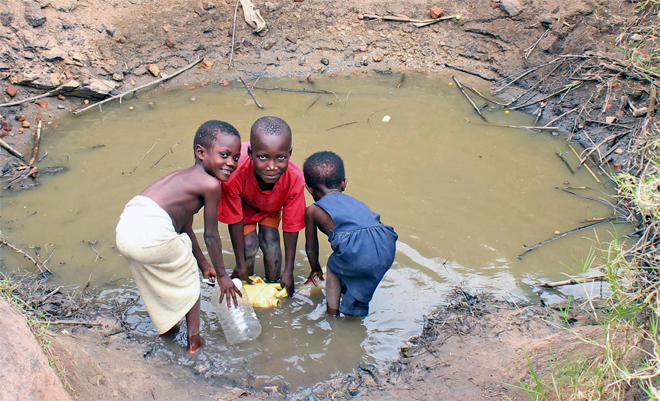 Children fetching water in a contaminated water-well in Nongo, Kayunga district. Due to the prolonged drought, wells have dried up. Photo by Tony Rujuta
Children fetching water in a contaminated water-well in Nongo, Kayunga district. Due to the prolonged drought, wells have dried up. Photo by Tony Rujuta
Arot and thousands of her colleagues have had to turn to the wilderness to put food on the table. "One has to walk a long distance to get food," says Arot, adding that she feels a lot of pain when she cannot provide food like her mother used to do many decades ago.
She says the price of most food crops such as cassava and sweet potatoes have doubled following a six-month dry spell causing food shortage in parts of eastern Uganda including Katakwi.
"We used to buy a basin of potatoes at sh5,000, but it has shot up to sh15,000." As we moved around Omasiaa, the clouds were gathering over the village, but Nelson Oyala, the Community Development Officer at Magoro was not excited about it.
"We live on a land of extremes. It is common for drought to be followed by floods," says Oyala, adding that floods are going to completely bury their hopes and displace thousands of people. CLICK HERE FOR MORE ON THIS STORY
Slum youth beating odds with support from European Union
By Jacky Achan
Life was good when Farouk Moses Kibirige lived with his mother in Bwaise. She was his sole caretaker.
He had a roof over his head. He was clothed, fed and educated by mother. But fate had other ideas. In his Senior Six, just before Kibirige could sit for his fi nal A'Level examinations, his mother died.
From then, Kibirige had to fend for himself. When he got his A'Level results he had passed, but did not have the money to pay for university education and no relative was willing to help.
His education dream looked all but over. But as luck would have it, Kibirige got to meet Muhammed Kisirisa, the founder and CEO of the Action for Fundamental Change (AFFCAD), the non governmental organisation that runs Bwaise Business and Vocational Institute (BBVI).
A scholarship followed and Kibirige now speaks about the future with ample optimism.
As a student at BBVI, Kibirige is one of about 200 youths supported by the Strengthening Social Cohesion and Stability in Slum Populations project (SSCoS).
The project is fully fi nanced by the European Union Trust Fund to the tune of euros 4.3m (sh16.4b).
It is implemented by the International Organisation for Migration (IOM) Uganda, in partnership with various organisations, including AFFCAD for the Bwaise area.
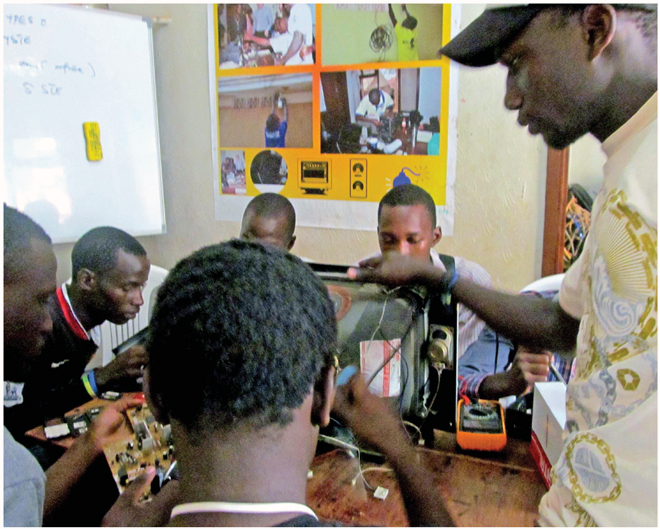 Students studying electric installation at the institute in Bwaise, Kampala
Students studying electric installation at the institute in Bwaise, Kampala
Among other things, the SSCoS project aims at tackling the drivers of radicalisation and violent extremism in the Kampala slums of Bwaise, Katwe, Kisenyi and Kabalagala.
According to the project's baseline survey, poverty and unemployment are among the root causes of communal confl icts in slums.
Hence SSCoS works to impart vocational skills in young people, help them get job opportunities and start-up capital for those who want to venture into self-employment.
Kibrige, 24, is enrolled for an electrical installation and repair course which he hopes to complete in December. But even before he even graduates, he is using the skills so far attained.
Working part-time at a friend's workshop, he can carry out simple electrical repairs under supervision.
"The little time I spent working, I am able to make sh6,000 in a day to take care of my needs," Kibirige says.
With palpable sadness, Kibirige laments that the image of slum dwellers like him is not good, because most people do not see "value" in them.
However, he says this only makes him work harder to prove the doubters wrong. CLICK HERE FOR MORE ON THIS STORY
ADVERTISER
THE EUROPEAN UNION EMERGENCY TRUST FUND (EUTF)
EU promotes human rights in Uganda
As the European Union (EU) commemorates 60 years, the Foundation for Human Rights Initiative (FHRI) wishes to express its solidarity with them as their partners and key player in the democratic process in Uganda. JACQUILINE sat down with Dr. Livingstone Sewanyana, the foundation's executive director and talked about how EU has been instrumental in promoting human rights in Uganda and what the 60 years of its existence mean to the country
QFirstly, familiarise us with what the Foundation for Human Rights Initiative does. What are some of the projects you are doing?
The foundation as an advocacy organisation has been working on various fronts to promote democracy and human rights in Uganda through many avenues namely; provision of legal aid to victims of human rights violations, especially women and children.
On average, we support over 1,000 cases annually, most of which comprise people who are victims of unfair dismissal and land grabbing among others.
The organisation works closely with Parliament to ensure that the Bills passed meet both constitutional and human rights standards.
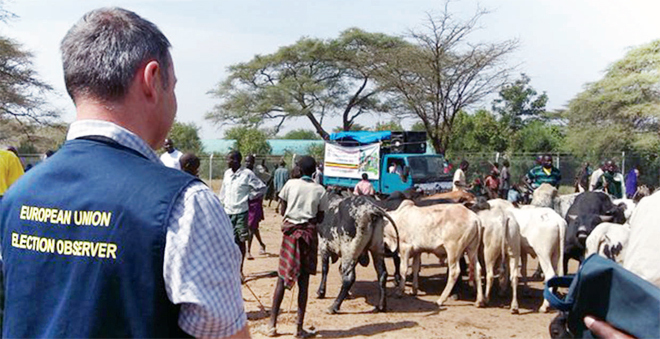 A European Union observer at a voter education rally at a market in Moroto district last year
A European Union observer at a voter education rally at a market in Moroto district last year
This has been achieved through training of Members of Parliament and submission of memoranda on Bills tabled in Parliament.
We also strove to influence the enactment of laws and policy that would promote the rights of Ugandans like the most recent Human rights enforcement bill, the law revision in criminal matters miscellaneous amendment Bill seeking to abolish mandatory death sentences. Other legislations include the Prisons Act, Access to Information Act and the Amnesty Act.
FHRI also works with partners such as the Judiciary and promoting judicial activism has been one of our preoccupations, not only through training of judicial offi cers, but also being party to the reforms the institution is promoting.
A typical example is our appearing before the case backlog committee to give our views on case backlog and how they can be eliminated.
We are also members of the sentencing guidelines committee. We also do rights monitoring and release periodic reports with the most recent being one on pretrial detention in Uganda and Human rights during the election We work closely with EU in ensuring that there is respect of human life through our campaign against the death penalty not only in regards to the policy, but also in improving the regulatory framework.
Through Citizens' Coalition for Electoral Democracy in Uganda and the Citizens Observers Network, which oversaw the elections last year, we have also worked to promote electoral reforms, as well as free and fair elections. CLICK HERE FOR MORE ON THIS STORY
Plan International partnering with EU to impact children's lives
At Teadwong Early Childhood Care and Development (ECCD) centre in Teadwong Parish, children can be heard singing and running about under the watchful eye of three adult minders.
The children take turns to lead others in singing. As you enter the classrooms, you will notice that parent educators are actively engaged with the pupils.
When a parent educator flashes a card with a letter, the pupils respond with the corresponding phonetic sound in unison. Indeed, before the ECCD centres were introduced, many children would not express themselves confi dently, locals say.
Parents did not know the value of educating children, care, nutrition, psycho-social stimulation, sanitation and hygiene. They also did not know much about protection and cognitive development.
This is because the primary schools in the area are far from their homes. This confined children at home as they waited to join primary school.
However, this predisposed them to domestic violence due to their curiosity as they explored the world around them. Felix Ocak, a lead care giver says education was considered a by-the-way since children had to walk up to 10km to the nearest primary school.
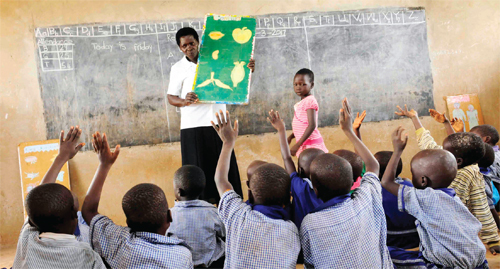 Children at Teadwong Early Childhood Care and Development Centre, Teadwong Parish - Lira, attend a lesson
Children at Teadwong Early Childhood Care and Development Centre, Teadwong Parish - Lira, attend a lesson
Being a rural area, most children here started school without having gone through the ECCD programme.
This made it diffi cult for teachers to orient new pupils into the education system, hence affecting their completion of the primary school curriculum within the allotted time.
"When the ECCD programme was introduced in the sub county, children nowadays go for early learning which prepares them for primary school. Even the education standards in the area have improved since parents are also sensitised on the value of educating their children," Ocak says.
At snack time, Mary Adongo, a parent enters one of the classes. The children are sitting in a circle. The parent educator asks them to pray before they eat their snack.
They all recite a prayer in English. Adongo is impressed. "This centre has given my son a head start in education. Before he started coming, he could not say a word in English. Now he speaks some broken English, but he is better than other children who are already in primary school, "Adongo, says.
The centre has writings all over the premises. Micheal Ongom, one of the Parent Educators says the writings help the learners to read at their own pace.
"Sometimes learners are organised in reading circles so as to share with each other what they have learned in class," he says.
These are just a few of the many success stories that are a result of Plan International Uganda's efforts supported by the European Union to combat silence against children in post confl ict districts of northern Uganda.
Plan International Uganda with support from the European Union (EU) has since October 2013 been implementing the Combating Silent Violence Against Children (VAC) project in the fi ve districts of Lira, Apac, Kole, Dokolo and Alebtong.
The project targets children and families in post-confl ict districts of northern Uganda. Plan International Finland provides technical coordination between Plan International Uganda and the EU. CLICK HERE FOR MORE ON THIS STORY
Supporting youth in achieving productive, sustainable livelihoods
By Andrew Masinde
Although Armstrong Okeng 22, is handicapped he is the head of a household with four children.
He says when his father developed mental illness and later passed on in 2001, his mother abandoned them. Okeng was only nine years old at that time, and yet he was also the eldest child.
For lack of fees, Okeng and his siblings eventually dropped out of school, "We kept doing odd jobs, offering our labour and growing some foodstuff on a small piece of land. We barely had enough to eat," he says.
He also says for them, clothing was a luxury. "Most people also despised me because of my disability. People thought I would not acquire any good thing. Some of them even asked me why I struggle when I did not have the ability to do anything good. Nevertheless, I did not allow their words to crush my spirit," he says.
Okeng says while he was still wondering what to do with his life and responsibilities, God answered his prayers through the launch of the Empowering Youth for Sustainable Livelihood Project in Lira by Plan International with support from the European Union.
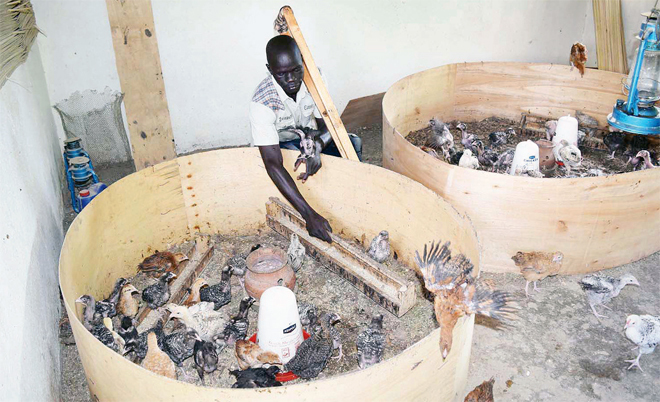 Okeng's poultry unit has 27 chickens. He now sends home between sh20,000 - sh30,000 every month
Okeng's poultry unit has 27 chickens. He now sends home between sh20,000 - sh30,000 every month
"I attended one of the meetings and passed the vulnerability assessment. I was given an opportunity to select a course for vocational training. I picked agriculture since this is what I knew I could do and I had a passion for it," he says.
After the training, Okeng secured a job at Ave Maria Vocational Training Institute as a poultry attendant.
"From this job, I used to earn sh70,000 per month. My wages were increased to sh100,000 per month after I completed my six-month probation period. The money I earned may have seemed little but I have achieved quite a lot in just fi ve months," Okeng says.
Okeng has saved and started his own poultry farm. "I now have 27 chickens, three goats, and I am also able to send home between sh20,000 - sh30,000 every month. I plan to send two of my siblings back to school this year," Okeng says.
In 2018, he says he plans to enroll for a formal certifi cate in agriculture.
As his savings and investments continue to grow, he has bigger plans as well. Okeng plans to build a permanent house by 2020. Asked what the most signifi cant change in his life has been, Okeng replies with a smile, "The vocational skills I have acquired." CLICK HERE FOR MORE ON THIS STORY
Ensuring sanitation, safe water for all
Adequate drinking water, sanitation, and hygiene (WASH) are all essential ingredients in ensuring human health and economic development of a country.
Sustainable Development Goal (SDG) six comes out strongly on this, addressing the issues relating to drinking water, sanitation and hygiene, but also the quality and sustainability of water resources.
Yet, despite the WASH subsector being considered the most developed in Sub-Saharan Africa, safe water and sanitation coverage in Uganda remains one of the challenges dodging the Ugandan government, with over 10 million Ugandans still living without safe water, 65% not practicing improved hygiene behaviour and about 8% of the population practicing open defecation.
Despite the Government's continuous effort to address the problem, the challenge of funding has proved to be a thorn in the provision of safe water and sanitation to the entire country, but with the intervention of the European Union, the hope of achieving SDG six, which is ‘ensuring access to safe water and sanitation for all,' looks possible. Over the years, the European Union (EU) has funded a number of water projects aimed at improving access to safe water and sanitation in Uganda.
The EU has supported a range of major water and sanitation projects.
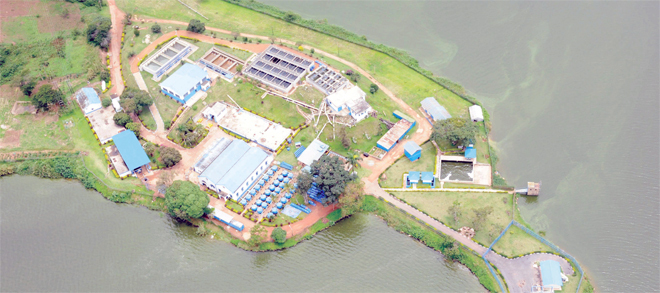 An aerial view of the National Water and Sewerage Corporation water treatment plant, located at Ggaba on Lake Victoria
An aerial view of the National Water and Sewerage Corporation water treatment plant, located at Ggaba on Lake Victoria
The Ggaba Treatment Complex
In January this year, President Yoweri Museveni, together with the EU head of delegation to Uganda, Kristian Schmidt, French Ambassador to Uganda, Stephanie Rivoal and German Ambassador to Uganda Peter Blomeyer, commissioned the new Ggaba water treatment complex that will increase water supply to Kampala, from 200 million litres to 250 million litres per day.
The plant, under the Lake Victoria Kampala Water and Sanitation Project is aimed at addressing water supply challenges in the greater Kampala metropolitan area.
The project is funded by the EU, the French Development Agency and the Government of Germany as part of the National Water and Sewerage Corporation's (NWSC) plan to connect water to all urban centres by 2020.
"This project stands out as the major intervention in the water and sanitation sector in Uganda for the last 20 years. It also delivers on a basic human right — Access to safe drinking water. It would be a catastrophic failure of governance and planning, if the inhabitants of Uganda's capital city would suffer water shortage, just on the shores of Africa's largest freshwater lake," said Schmidt during the launch of the plant.
The water project will see at least 500,000 people added to the water supply line in Kampala and Wakiso districts. CLICK HERE FOR MORE ON THIS STORY
At a glance: The EU Economic Partnership Agreement with EA
By Prossy Nandudu
The Economic Partnership Agreements (EPAs) are trade and development agreements negotiated between the European Union (EU) and African, Caribbean and Pacific (ACP) partners engaged in regional economic integration processes.
While negotiations with Uganda, Kenya, Rwanda and Burundi started under the Eastern and Southern Africa (ESA) configuration with Tanzania under SADC, in 2007, the five countries started negotiating as a bloc under the EAC so as not to threaten regional integration.
Under the proposed agreement, the EAC is to enter into a full reciprocal Free Trade Agreement with the EU.
Countries that have signed
As of September 1, 2016, Kenya and Rwanda individually signed the EPA without the rest of the EAC partner states and subsequently, on September 20, 2016, Kenya ratified and deposited her ratification instruments with the EU.
Uganda has not yet signed, but is ready to if all EAC countries agree to do the same. Ratification in this case means Kenya took the documents to Parliament for review before depositing them with the European Union.
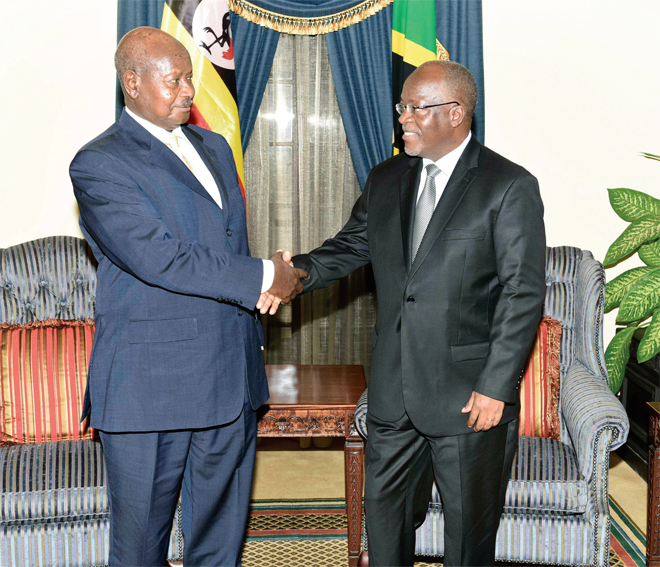 President Yoweri Museveni and Tanzania President Dr John Pombe Magufuli in Dar es Salaam at a recent EAC summit
President Yoweri Museveni and Tanzania President Dr John Pombe Magufuli in Dar es Salaam at a recent EAC summit
And this is a requirement for all countries that sign the agreement. Rwanda signed, but has not yet ratified while Burundi has not yet signed because it under sanction by the EU.
Tanzania says it has not signed until it gets a final assessment on the implications of the agreement on their economy.
At what stage is Uganda?
According to the state minister for the East African Community Affairs (MEACA) Julius Wandera Maganda, Uganda is supposed to sign at a date to be communicated.
President Yoweri Museveni recently joined his counterpart, the Tanzanian President Pombe Magufuli to allow room for consultations on the implications of EPAs to the region, Maganda said.
Some of the fears advanced by Tanzania were that opening up of the region to the EU would reduce the market for goods from the region on the international market.
However, Dr Fred Muhumuza, an economist and lecturer, believes Ugandan manufacturers should get worried of the increasing number of imports from Asian countries instead of worrying about the EPAs because Uganda imports more from Asian than Europe exports to EU markets other than Asia. CLICK HERE FOR MOREON THIS STORY
Uganda-EU enjoy positive trade balance
By Prossy Nandudu
For the first time since 2015, Uganda has registered a positive trade balance with the EU of €2m.
The EU has been importing from Uganda proportionately more than exporting to Uganda since the last three years.
Imports of coffee (€262m or more than 50% of the total) increased by 15% in the last three years, cocoa by 60% becoming the fourth highest import (€36m) and tobacco by 15% (5th highest at €32m) while fisheries (second highest at €56m euros) and cut flowers (third at €47m) slightly decreased.
Although only 3% of the total imports of other vegetables and fruits almost doubled at €15m in 2015.
Promoters and exporters of Ugandan coffee can still access European markets with or without signing the Economic Partnership Agreements (EPAs) with the European Union (EU).
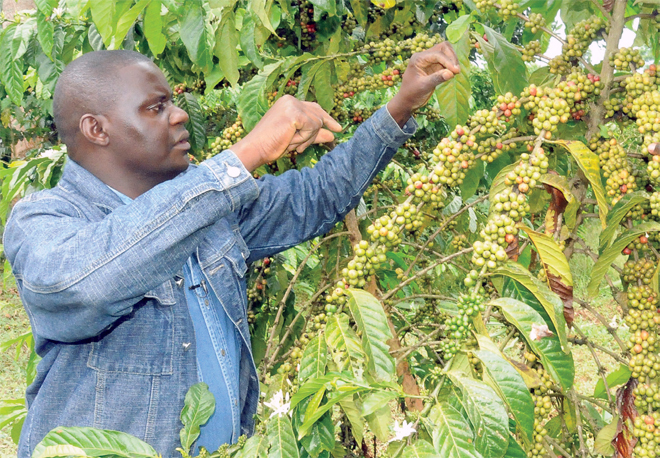 Coffee farmers in developing countries such as Uganda have called for preferential treatment on the market to allow them grow
Coffee farmers in developing countries such as Uganda have called for preferential treatment on the market to allow them grow
This is possible under the provisions of the Everything but Arms deal.
According to Joseph Nkandu, the executive director of the National Union of Coffee Agribusiness and Farm Enterprises (NUCAFE), much as there is that provision, before Uganda signs the EPAs, there should be a special and preferential treatment for a developing country to enable its industries to grow.
"There should be what I call special preferential treatment for a developing country such as Uganda that some concession should be made taking into consideration the growing industry.
This is such that we, for example, do not get very cheap processed coffee coming here to compete with the local coffee roasting industries," said Nkandu. CLICK HERE FOR MORE ON THIS STORY
LINKS TO MORE EU SUPPLEMENT STORIES
TRACING UGANDA'S RELATIONS WITH EU
IN PICTURES: EU PROJECTS IN UGANDA